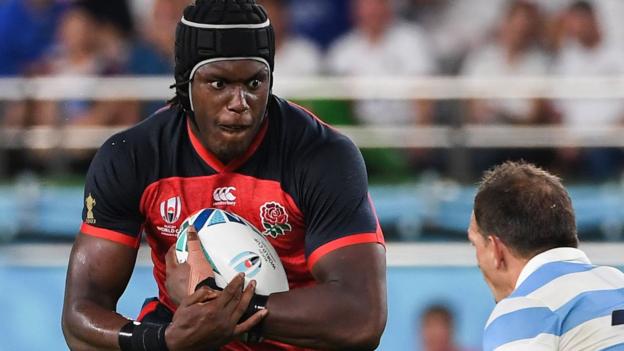
This has been a strange World Cup so far for England: a series of skirmishes rather than a defining battle, a sense of perpetual warm-ups rather than ever being pushed to their limits.
All that changes this weekend, for their quarter-final against Australia carries with it not just the pressures of a World Cup knockout match but four years of the Eddie Jones regime too.
A defeat might spell the end of coach as well as his team's tournament. Suddenly, after a long phony war, it is all on the line.
And so all the talk around the England hotel, up in the forested hills among the natural springs and tall concrete hotels of Beppu, is of looking forward rather than looking back, of opportunity and excitement rather than fear of the what ifs and maybes.
"The time before a game is a very weird time, because it's a time when you're nervous, but you're excited too," said lock Maro Itoje.
"You know you're about to step into something that could be uncomfortable, but at the same time that feeling in itself, in isolation, is not a very nice feeling.
"But you have to love that feeling, because the times when I haven't been playing, or I've been injured, that feeling before a game is one of the things I really miss."
Itoje, along with Owen Farrell and Billy Vunipola, is one of the titans of Jones' squad, not 25 years old for another couple of weeks but with six wins on the spin against the Wallabies in his recent past, a player who arrived in international rugby almost fully formed and who would be in most people's world XV.
Australia have played only in patches at this World Cup, their half-backs seemingly on irregular rotation, head coach Michael Cheika cantankerous in many of his public appearances.
But they remain a latent threat, a team that beat world champions New Zealand only two months ago, an outfit that would like nothing more than to bloody the nose of one of their own in Jones.
Itoje, with four Premiership titles with Saracens and two European Champions Cups, will fall back on a familiar routine come Saturday. No alarm-clock, because he will wake early naturally. Thoughts not only of what is to come but on the lessons his earlier battles have taught him.
"I like to try to stay as calm as possible for as long as possible, but the nerves will have started by then," he told BBC Radio 5 Live.
"When I was much younger I struggled a lot more with it. I was very quiet, very serious. A little bit angsty. But now I'm much more relaxed. Very focused.
"I normally speak to my parents. They do get more anxious than me.
"If I speak to my mum she just wants to know how I am, what I'm doing. My dad likes to pray for me, so every game day I like to have a short prayer with him on the phone.
"Your body is on alert mode. It's taking in the information that is in and around it. It's one of those situations where experience helps.
"It's a weird feeling, and I find it uncomfortable, but I love it too.
"It's the type of feeling where you're going to step into something and you have an idea of what's going to happen and how it's going to play out, but you don't really know exactly what."
Changing rooms before big matches can be fraught places. So much at stake, for players and their careers as well as those of coaches. All those supporters spending thousands of pounds to be in the stadium, so many more watching on at home.
Itoje will try to take the heat out of it, knowing he will need to bring it back when the whistle goes.
"Most of the time it's actually quite calm. It's calmer than a lot of people would actually expect. I haven't seen anyone head-butting each other. No-one is slapping each other's faces.
"The thing I've learned is that you have to enjoy the process, and not just the outcome. Rugby is a difficult game, and if you only enjoy the game, then it's going to be tough.
"You have to relish every single moment. But that period can be so uncomfortable.
"If you could fast-forward it - I wouldn't say take me back home, but if you fast-forward it to the whistle, then sometimes I might take that option."
When he walks out of the tunnel at the Oita Stadium just after 4pm on Saturday afternoon, 80 defining minutes ahead of him, what will he be thinking about?
"There are so many pressures - external ones, internal ones. The most important thing is to think clearly so that you make the best decisions for yourself and the team," he said.
"Just being in control of my body. Being in control of my actions. Trying to think clearly, because there are so many emotions running through."















 Phone: (800) 737. 6040
Phone: (800) 737. 6040 Fax: (800) 825 5558
Fax: (800) 825 5558 Website:
Website:  Email:
Email: 






